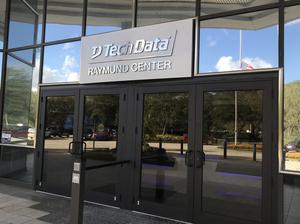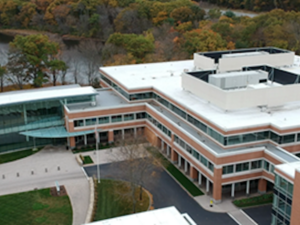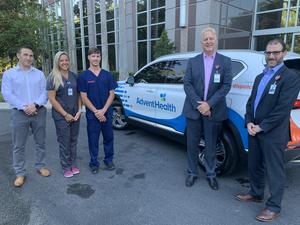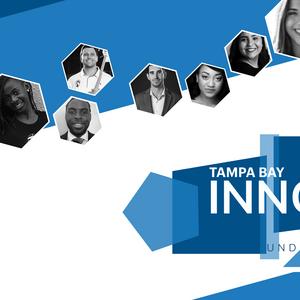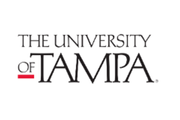In May 2020, statements and budding initiatives began to sweep across the nation after the death of George Floyd, with promises to bridge the gap so often seen by Black and brown startup founders. Some of those initiatives were kickstarted in Tampa Bay, and we followed up with the founders one year later, to see the change that has been made, what's missing and what's to come.
Synapse Florida launched an 'Inclusion Lives Here' committee
While the committee had been in the works since at least April, it was kickstarted after the murder of George Floyd in Minneapolis, and subsequent national conversation on race.
"It's a very important part of the journey, and I use 'journey' because there is always room for us to grow," said Lauren Prager, VP of community engagement. "It's not enough for us to talk. It must be married with action; we are walking the walk. Creating the strategy groups is great, but we have to actually do the work. So, with our KPIs, they're very tangible."
The group has both internal and external goals, as well as long- and short-term goals that run the gamut of improving its diverse supplier relations, to upping the diversity of speakers at its annual Synapse Summit. According to Prager, 60% of the speakers at Synapse Summit 2021 were women and/or from under-represented groups, including three of its keynote speakers. She also emphasized the members of the Inclusion Lives Here committee serve on other committees across the organization, including its board of directors.
"It's important to us that it's very clear this is not a side thing, it's central — our board unanimously voted to create the Inclusion Lives Here committee," Prager said. "So it's officially part of the organization, and we worked as a team to reach those goals set out on the page, and to create a space to have direct conversations."
Many of those conversations are held at their biweekly "Libate and Learn" virtual events, of which 90% have featured a woman or minority panelist. The next event will be "Successful DEI in Action: A Community Conversation," held on June 22.
"We're a very action-driven organization and I want all of our community to learn from those of us that have taken tangible steps and had a direct impact on its employees and community," she said.
St. Petersburg investment firm Seedfunders launched the "Opportunity Fund, focused on Black-led startups
The Opportunity Fund has made one confirmed investment since its launch, according to CEO Dave Chitester. It invested $50,000 into Orlando-based College Thriver, which helps provide low-income students access to rigorous college programs.
The fund is intended to serve as the "friends and family" round for Black tech founders, which is typically a smaller amount raised by the founders' immediate network before approaching investment firms.
The low number of deal flow can be attributed, Chitester says, to the due diligence needed in an investment, versus a loan or grant.
"We would like to go faster obviously," he said. "It's turning out to be more involved. It's a slow process. We’re investing to help the company, but also to make money for the fund, which then can be rolled back to make more investments."
He added he struggles to find Black tech startups that have growth potential.
"It's tech investing — we’re not doing restaurants or lifestyle, we're looking for tech and it is tough finding tech startups for 'regular' investments, let alone ones geared toward Black entrepreneurs," he said. "It's tough all over."
On the flip side, it's been often stated by BIPOC founders that funding simply isn't available.
"When I got to the point that I am at now, which is ready to scale, it’s extremely difficult for me to get funding,” Trimeka Benjamin, founder of Tampa-based Swim Digital Group, said in a previous interview. “I’m 10 years in, over a million dollars in revenue and it’s still hard to scale. I look at my Caucasian counterparts who I’m fairly certain are on a similar trajectory and they don’t have that issue. Why? I’m not sure."
Chitester does hope others will join him in his funding efforts, specifically at the pre-seed stage.
"When we get these companies funded at that [pre-seed] level, we can feed them up and then do the $100,000 funding, and then feed them to Florida Funders or other investment firms," he said. "It's all part of the ecosystem. It would great to have others join us at the very beginning, to build that up."
To apply for the funding, head here.
'Hire or Wire Now' initiative sees stalled support
"I wish I had a better story for you," said Deon Bradley, founder of the Hire or Wire Now initiative. He launched the nonprofit last year with a simple goal: Hire minorities or pay them funding for their companies. "It was all talk as usual. Something happens, they get in the streets, corporations feel they have to put out statements, but don't give a damn. If they did, they would actually place money where their mouth is."
Bradley, who is also the founder and CEO of Bradley Coaching and Consulting, said he is at a standstill when it comes to receiving support.
"They said, 'We will work with you and love what you're trying to do, the hurdle is you have to go directly to Silicon Valley and get support. Then we’ll help,'" he explained. "But this is part of the problem: African Americans don't have those contacts in Silicon Valley. I reached out to all types of organizations there and it fell on deaf ears, even to similar types of organizations like me."
Bradley did point to the work the Tampa Bay Wave has done with its TechDiversity cohort, as well as Synapse Florida's efforts. But other local venture capital funds and startup supporters, he said, could follow suit.
"To be quite frank, they're only interested in working with certain people," he said. "So some of them aren't interested in working with me. It's the 'good ole boys' network thing."
He is seeking those who can help him forge connections in Silicon Valley, who can then help give credit to his overall organization.
"It is what it is; if I can get some contacts, I'll go right back at it," he said. "In the meantime, I'm meeting with people who might have them, since I don't. I'm a resilient person and I don't give up easy."
'Equity in Entrepreneurship' program graduates 20 companies but needs funding help
The program, which is held through the AMRoC Fab Lab located in University Mall, was also in the works long before statements and initiatives began to form in May 2020. However, it hosted its first cohort in August and is finishing up its second cohort now. It has a 90% completion rate and will have 20 companies graduate from the program.
Unlike other accelerator programs in the region, the Equity in Entrepreneurship program focuses on community-based, early-stage entrepreneurship development, not exclusive to tech. They help people turn a side hustle or informal business ideas and flesh it out to incorporated, sustainable small businesses.
"We need more of these small businesses, especially in the Uptown area where gentrification will be a real issue," said Terri Willingham, executive director of the Foundation for Community Driven Innovation, which runs the Equity in Entrepreneurship program at the AMRoC Fab Lab. "Helping people start those businesses, and establish them now in a sustainable fashion, helps them grow. Because of Covid, for some, it's make it or break it. And anyone who can rely on themselves doesn’t have to rely on others and can have a more successful productive economic life."
The organization is currently supported by Truist, the Truist Foundation and Florida Blue, and has helped invest $30,000 back into the community. However, Willingham said there is always more opportunities to receive additional funds.
"We’re not giving out huge amounts of money, but if we can get more support from the community, everyone wins," Willingham said. "There are millions and millions put into tech startups. You put $1 million into an early-stage development program in Tampa, you can generate so many more jobs. The return on the investment it has would impact everyone — not just a particular app, it would affect an entire community."
